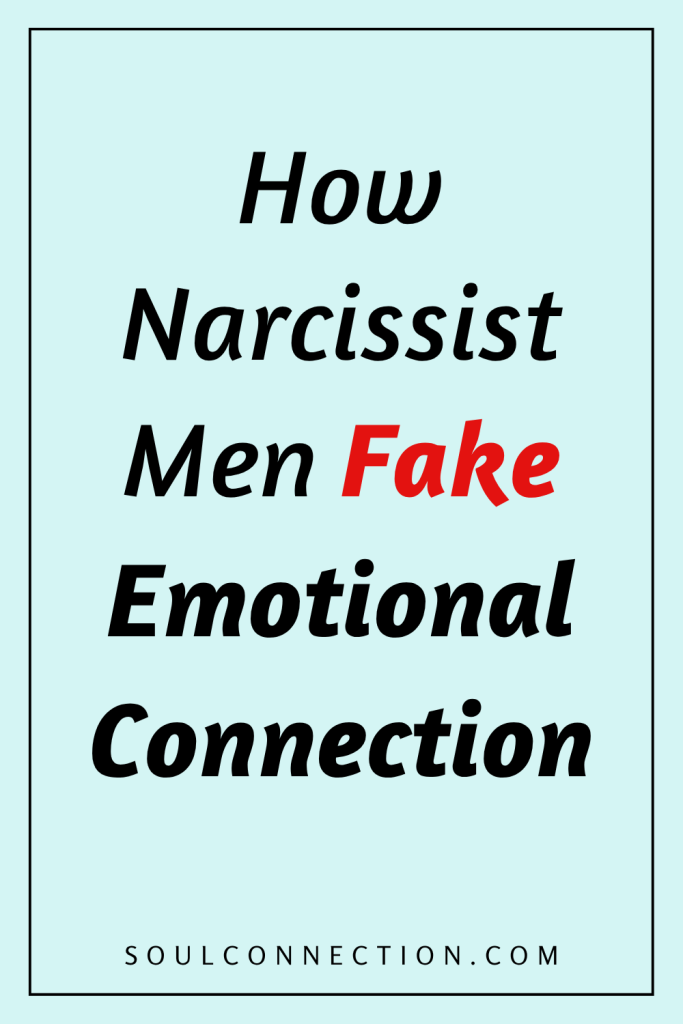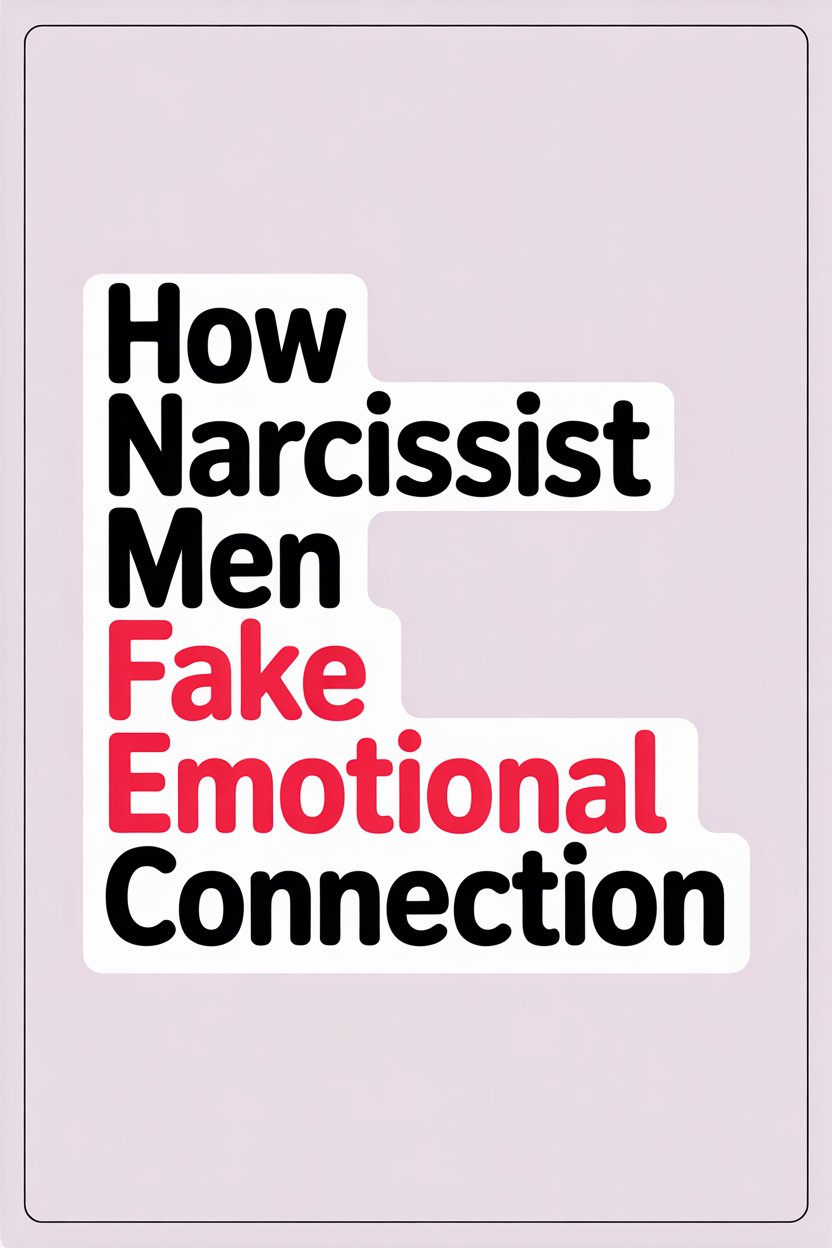Picture it: you’re sitting across from a man who seems to have all the emotional depth of a puddle after a summer rain. But, wow, does he appear to be tuned into your every feeling.
If your gut insists something is off, you’re probably not imagining things. Narcissist men are legendary for faking emotional connection.
They do it with the finesse of a magician pulling rabbits out of hats, except the rabbits are just your genuine emotions, and the hat is their bottomless bag of tricks.
The Art of Mirroring: Copy-Paste Emotions
Narcissist men have a favorite party trick: mirroring. Ever noticed how he seems to agree with your opinions, match your excitement, and even pretend to share oddly specific interests you never mentioned out loud?
It’s not telepathy; it’s emotional copy-paste.
Mirroring works because it makes you feel instantly understood. He becomes your “soulmate,” not because he’s actually empathizing, but because he’s parroting your own feelings back at you.
Watch for telltale signs: answers that are a little too perfect, hobbies that conveniently align with yours, or stories that sound suspiciously familiar.
The Well-Timed Compliment Avalanche
Who doesn’t love a compliment? Narcissist men know this universal truth and wield flattery like a Jedi with a lightsaber.
Compliments rain down at all the right moments: when you’re vulnerable, when you doubt yourself, when you need reassurance.
This isn’t real emotional support—it’s a smoke screen. The goal? Get you hooked on his approval, so you overlook the lack of genuine connection behind the curtain.
Sure, we all want someone to say “you’re amazing,” but it’s worth asking: is he saying it to build you up, or to keep you coming back for another ego stroke?
Storytelling for Sympathy
Nothing says “emotionally available” like a tragic backstory. Narcissist men have a sixth sense for when to pull out tales of woe. Maybe he was mistreated by every ex.
Maybe his childhood was a minefield of heartbreak. You find yourself feeling protective, special, needed.
These stories often have more plot holes than a low-budget soap opera. But when told with the right mix of vulnerability and drama, they make you feel like you’re the heroine who can save him.
Spoiler: he’s not looking for a savior—he’s looking for an audience.
The Pseudo-Listener in Action
Ever shared something important and watched him nod at all the right places, only to realize later he didn’t remember a single detail? Welcome to the world of the pseudo-listener.
Narcissist men become masterful at feigning interest—eye contact, reassuring nods, the occasional “wow, that must’ve been hard for you.”
But rewind the conversation in your head. Did he actually ask thoughtful follow-up questions, or just pivot back to himself as soon as possible?
True connection means holding space for your feelings, not just waiting for a pause so he can talk about his.
Emotional Bait and Switch
At first, he’s an open book. He tells you his fears, dreams, and deepest secrets (or so he claims). You feel honored to share this level of intimacy. Then, when you try to open up in return, the page mysteriously turns.
Suddenly, your emotions are minimized, redirected, or—on a bad day—used against you in a future argument.
This game isn’t about connection; it’s about maintaining control. Your vulnerability becomes a bargaining chip, not an invitation for closeness.
The Empathy Impersonator
Narcissist men have studied empathy like it’s an improv class. Need someone to tear up during your sad story? He can fake it. Going through a tough time? He’s there with all the right words—at least until it’s no longer convenient.
The mask slips when real empathy is required: sacrifice, patience, or consistency. If his “support” vanishes when you genuinely need it—or he pulls a vanishing act after your big emotional reveal—the emotional connection was just a clever ruse.
Fast-Forward to Intimacy
Ever wondered why things with him moved from “nice to meet you” to “deeply bonded” at warp speed? Narcissist men are experts at emotional acceleration.
Love bombing, whirlwind declarations, and intense promises create the illusion of rapid closeness.
This isn’t about getting to know you; it’s about getting you attached before you notice the cracks. Healthy connection takes time. When it feels like someone’s trying to speedrun romance, it might be time to pump the brakes.
Confusing Vulnerability with Oversharing
Sharing details from his past sounds vulnerable—until you notice it’s more like an info dump with a side order of “feel sorry for me.” Narcissist men often confuse raw honesty with unfiltered overexposure.
You’re left with the sense that you must open up too, or risk seeming closed off. That’s not mutual connection. That’s a strategy to fast-track your emotional investment and keep you off balance.
The Grand Apology Performance
Caught him in a lie, a betrayal, or a disappearing act? Here comes the Academy Award-worthy apology. He’ll sob, he’ll promise, he’ll say all the things—just as long as it gets him off the hot seat.
But pay attention to the aftermath. Genuine emotional repair involves changed behavior, not just a dramatic speech. If his remorse never translates into action, he’s leveraging your empathy, not sharing it.
Ghosts in the Machine: Digital Deception
Modern communication is a narcissist’s playground.
Through texts, DMs, and voice notes, he can curate every word for maximum emotional impact. Emojis, heart reactions, sappy memes—he’s got the whole toolkit.
When digital affection never quite matches up in person, or the written warmth turns to ice the moment you need something real, you’re dealing with a counterfeit emotional connection.
The pixels are working overtime, but the heart is out to lunch.
Why It Works—and What To Do Next
This emotional sleight of hand works because it targets our basic human need to be seen and cherished. Narcissist men are skilled at identifying what we want to hear and then serving it up with a flourish, all while avoiding genuine vulnerability.
The trick is not to blame yourself for getting drawn in. These performances are convincing for a reason: we want to believe them. But trust isn’t built on perfectly-timed stories or flattery marathons.
It’s built on consistency, presence, and a willingness to show up—even when there’s nothing in it for him.
How to Spot Real Connection in the Wild
If you’re wondering how to separate the wheat from the narcissistic chaff, keep your eyes peeled for these signs:
- Actions match words, even when nobody is watching.
- He listens without immediately steering the conversation back to himself.
- Your feelings aren’t just heard—they’re remembered and respected.
- Apologies are followed by actual change, not just dramatic monologues.
- The pace of intimacy feels mutual, not like you’re being swept along by a riptide.
Testing these waters requires patience and a dash of skepticism. True connection doesn’t have to be a scavenger hunt, but it does require time and honesty—on both sides.
Taking Back Your Emotional Power
If you’ve realized you’re waltzing with a master performer, it’s not the end of the world. Emotional connection shouldn’t feel like a stage show where you’re the only one clapping.
Start by noticing how you feel after interactions: energized, understood, or quietly worn out?
Boundaries aren’t selfish—they’re essential. If his idea of intimacy leaves you feeling emotionally shortchanged, you have every right to demand more. (And if you’re told that’s “too much,” you’ve just been handed another clue.)
Tuning into Your Own Intuition
One silver lining to this circus is that it sharpens your intuition. Notice the moments when your gut whispers, “Hmm, something’s fishy.” Listen to that voice. It’s far wiser than any smooth talk or teary-eyed confession.
Connection isn’t about constant fireworks or poetic declarations. Sometimes it looks like showing up for tough conversations, sitting in silence, or remembering your coffee order.
If the man across from you can’t manage those basics—well, there’s no Oscar for Best Supporting Narcissist.
Happily Never After?
Faux emotional connection can be dazzling at first, but it can’t withstand the realities of everyday intimacy.
If you’re stuck wondering why you feel alone even with someone who says all the right things, it might be time to swap out the magician for a real partner.
The happiest relationships are built on mutual vulnerability, honest support, and—shocker—actual empathy. No sleight of hand required.


